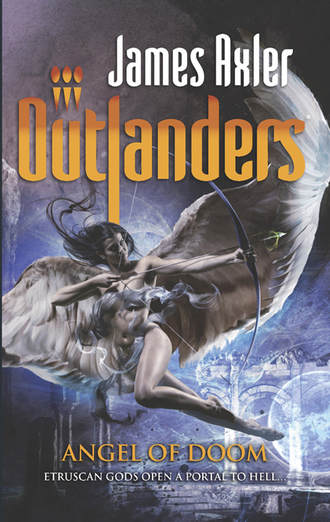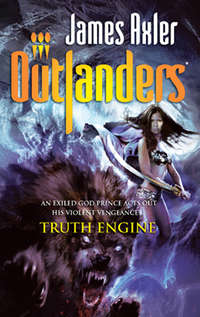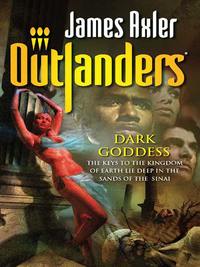
Полная версия
Angel Of Doom

MYTHIC PROPORTIONS
Insidious alien forces conspiring to enslave humanity grow increasingly dangerous and defiant. Willing to do whatever it takes to defeat these ancient invaders, the Cerberus rebels carry on the fight for freedom.
DAMNATION THRALL
The Cerberus fighters embark on an urgent quest to discover what happened to expeditions lost in Italy, on land that once belonged to the Etruscan empire. On site they encounter the monstrous Charun, armed with the hammer of the gods, and Vanth, the angelic winged huntress with a heart of evil. These alien gods are intent on opening a portal to bring their kind to earth, harnessing the power of victims’ minds while using their bodies as shock troops. As the river Styx is poised to flow again, the Cerberus team must prevail or an invasion from a barbaric dimension will lay siege to Europe…and beyond.
A second brilliant sun had appeared, blazing white and hot
Edwards scrambled to his feet, standing on the front of the Manta. The machine pistol snapped down into his fist, ready to go into action, but the strange glowing disc wasn’t moving. He put on his shadow suit’s faceplate and hoped for the visor to screen and filter out the blinding light, as well as analyze the object in the sky.
The range was ten miles, and it was advancing quickly.
He activated his Commtact microphone. “Guys, wherever you are…”
Nothing. No response, not even static. He turned his gaze back to the sky. For all the polarization of the lenses, he couldn’t make out a detail of the blazing comet looming ever closer. But in the space of fifteen seconds, it had closed to nine miles. He couldn’t get details about the shape of the object, only its range, and there was no guarantee that was right.
Edwards turned to open the cockpit, but the command signal to remotely open the canopy was also jammed.
He was in a complete blackout.
Angel of Doom

James Axler

A dreadful ferryman looks after the river crossing, Charon, appalling filthy he is, with a bush of unkempt white beard upon his chin, with eyes like jets of fire.
—Virgil, Aeneid
The Road to Outlands—From Secret Government Files to the Future
Almost two hundred years after the global holocaust, Kane, a former Magistrate of Cobaltville, often thought the world had been lucky to survive at all after a nuclear device detonated in the Russian embassy in Washington, DC. The aftermath—forever known as skydark—reshaped continents and turned civilization into ashes.
Nearly depopulated, America became the Deathlands—poisoned by radiation, home to chaos and mutated life forms. Feudal rule reappeared in the form of baronies, while remote outposts clung to a brutish existence.
What eventually helped shape this wasteland were the redoubts, the secret preholocaust military installations with stores of weapons, and the home of gateways, the locational matter-transfer facilities. Some of the redoubts hid clues that had once fed wild theories of government cover-ups and alien visitations.
Rearmed from redoubt stockpiles, the barons consolidated their power and reclaimed technology for the villes. Their power, supported by some invisible authority, extended beyond their fortified walls to what was now called the Outlands. It was here that the rootstock of humanity survived, living with hellzones and chemical storms, hounded by Magistrates.
In the villes, rigid laws were enforced—to atone for the sins of the past and prepare the way for a better future. That was the barons’ public credo and their right-to-rule.
Kane, along with friend and fellow Magistrate Grant, had upheld that claim until a fateful Outlands expedition. A displaced piece of technology…a question to a keeper of the archives…a vague clue about alien masters—and their world shifted radically. Suddenly, Brigid Baptiste, the archivist, faced summary execution, and Grant a quick termination. For Kane there was forgiveness if he pledged his unquestioning allegiance to Baron Cobalt and his unknown masters and abandoned his friends.
But that allegiance would make him support a mysterious and alien power and deny loyalty and friends. Then what else was there?
Kane had been brought up solely to serve the ville. Brigid’s only link with her family was her mother’s red-gold hair, green eyes and supple form. Grant’s clues to his lineage were his ebony skin and powerful physique. But Domi, she of the white hair, was an Outlander pressed into sexual servitude in Cobaltville. She at least knew her roots and was a reminder to the exiles that the outcasts belonged in the human family.
Parents, friends, community—the very rootedness of humanity was denied. With no continuity, there was no forward momentum to the future. And that was the crux—when Kane began to wonder if there was a future.
For Kane, it wouldn’t do. So the only way was out—way, way out.
After their escape, they found shelter at the forgotten Cerberus redoubt headed by Lakesh, a scientist, Cobaltville’s head archivist, and secret opponent of the barons.
With their past turned into a lie, their future threatened, only one thing was left to give meaning to the outcasts. The hunger for freedom, the will to resist the hostile influences. And perhaps, by opposing, end them.
Contents
Cover
Back Cover Text
Introduction
Title Page
Quote
The Road to Outlands
Chapter 1
Chapter 2
Chapter 3
Chapter 4
Chapter 5
Chapter 6
Chapter 7
Chapter 8
Chapter 9
Chapter 10
Chapter 11
Chapter 12
Chapter 13
Chapter 14
Chapter 15
Chapter 16
Chapter 17
Chapter 18
Chapter 19
Chapter 20
Chapter 21
Chapter 22
Chapter 23
Chapter 24
Chapter 25
Chapter 26
Copyright
Chapter 1
They had marched from the sea, landing on the western coast of Italy after a long journey, and when they arrived, they were a full expedition. Three of the fifteen-foot-tall Gear Skeletons, the walking combination of body armor and tank, had been the heavy muscle of the Olympian expedition to Italy. Forged from secondary orichalcum, which combined both lightness of frame with incredible durability, the fearsome war machines were armed with shoulder-mounted light machine guns. But the Gear Skeletons were also versatile, their strength obviating the need for bulldozers or other heavy machinery.
Captain Myrto Smaragda and nineteen of her brethren, brave Olympian men and women, were the bulk of the expedition escorting the powerful war machines. They were experienced soldiers who wore Praetorian armor, a blend of leather and polymer to pay homage to the armor of ancient Greek warriors, all the way down to the odd officer’s side arm: a three-foot falcata such as Smaragda’s own keen sword. The human troops were no more primitively armed than their walking robotic companions. Each soldier was equipped with a helmet with advanced night-vision optics and built-in comms that would keep the warriors in touch with each other. The radio with the power to reach back home to New Olympus rode on the broad back of one of the three Spartans. The device was capable of broadcasting hundreds of miles, thanks to the ancient Annunaki technology, especially the charged energy modules that were built into the millennium-old skeletal robots.
The Gear Skeletons had been designed for use by a smaller race. Former archivist Brigid Baptiste of the Cerberus Redoubt had explained that they were made to accommodate trans-adapts: half-size humanoids of great cleverness, density and durability. As such, there was nearly no leg room for a full-size human. Fortunately the horrors of war had meant there were plenty of capable amputee volunteers to ride in the chests of these great war machines. Amputees were the only norms who could pilot the machines from their truncated cockpits.
Despite their impressive weaponry, Smaragda and her unit were not here as conquerors; they were here as explorers. Even so, they came equipped to defend themselves from whatever horrors lurked on the Mediterranean Sea or in the Etruscan countryside. For years Smaragda and her fellow warriors had battled against the mutated hordes unleashed from the Crack, an abyssal canyon wherein the genetic weapons of long-lost eras were rekindled and turned into a means of ensuring the domination of the young Greeks.
“Remember this. We believed in the ideals of freedom, even as Hera covered our eyes with the scales of her deception,” Diana had told them. “Zoo gave his life so that we could be free of the facade of a false war and to ensure our freedom and self-determination. We can do no less to protect the liberty and freedom of those who will be our neighbors and, hopefully, allies or friends.”
The caution toward gentleness was accompanied by another admonition. “I also will not throw away twenty-three lives and three ancient, alien artifacts to prove how nice we are. If someone tries to kill you, you kill them right back! We’re not loading cupcakes and cotton balls into your machine guns.”
So here the group was, the Spartans ambling with their long brass limbs taking enormous but slow strides so that they didn’t force the New Olympian soldiers to march too hard or heavy. Smaragda knew the giant machines had the ability to cross a hundred miles in the space of an hour, their nimble, precise legs allowing them traction and sure footing on even the roughest of terrain. Even so, the pilots weren’t impatient, allowing their machines to move at such a sedate pace. The Charged Energy Modules that activated and motivated their limbs were remarkable pieces of technology thanks to the Annunaki, the same aliens who had at once created the warrior robot suits and the ones who had kicked off the massive, crippling war that had left New Olympus slow to recover.
Even so, there was little assurance that the CEMs, despite capturing and recovering them from the crashed scout ship that inserted itself into the war, were an inexhaustible supply of power. Just because they had not run one down completely didn’t mean they could not be drained. No one knew how to recharge them, despite the combined efforts of New Olympian and Cerberus scientists.
Unnecessary wear and tear on the crystalline jewels of concentrated energy was to be frowned upon, as well as pain and injury to the pilots. The properties of secondary orichalcum made it rustproof and immutable from hammering or cutting by conventional tools. It also did well to absorb even the hardest of falls and other impacts, lessening the effects upon the pilots. But even with those amazing attributes, the amputee warriors nestled in their chests were still vulnerable. They had not been called Gear Skeletons for nothing, requiring conventional vehicle panels to enclose the users to shield them from the elements and oncoming attacks.
Even with their cushioned pilot chairs, however, movement at high speed and the prodigious leaps the war suits were capable of did leave their pilots with pulled and torn ligaments as well as minor fractures in their spinal columns, even whiplash.
More vulnerable to attack, the body-armor clad Praetorians at least didn’t have to worry about their own physical abilities ripping them or shattering them when they fought to the limits of their bodies.
Smaragda flicked the visor of her helmet to scan mode, sweeping along the sides of the road, searching for unusual heat sources on infrared. The last thing they needed was an ambush. There was not supposed to be an enemy force in this part of the country, despite the rumors that had drawn them here.
Something dark had been awakened in recent days. Towns and villages in the interior had stopped communicating, stopped trading, disappearing as if they had never existed. One man returned from a visit to such a village, his hair turned white, speaking of “they who walked as ghosts” and of winged angels, both horrible and wonderful.
The Italians had turned to their neighbors, seeking help, and New Olympus’s new rulers sensed that such occurrences bore the stink of urgency. A full army would be too much, but with the stories of the horrible angels, the trio of mobile armor suits was, hopefully, going to be sufficient. There was a line between coming in too hard or too soft. Smaragda felt better with the Skeletons lumbering at her side.
All being well, with them present, they would be prepared for the very worst. Three giants with shoulder-mounted machine guns and enormous axes and swords would dissuade any opponent, even if they were winged angels of gigantic proportion themselves.
Smaragda scanned the sides of the road leading to the town that had spooked the Etruscan traders so badly, looking for signs of what could have terrified the lone survivor. She gripped her M-16 rifle tightly, but she kept her finger wrapped around the handle, firmly under the trigger guard so as not to accidentally set off the weapon. She was in no mood to waste ammunition or to cause undue injury. Carrying your gun with your finger on the trigger was a sure way to do both.
Over the heavy, ponderous thuds of the Spartans’ gigantic claws, Smaragda picked up something that she couldn’t quite make out. She immediately held up her fist.
The trained Olympians came to a halt.
Deafening silence descended upon the Greek column and she realized what felt so odd.
There were birds on the branches of the trees along the road, but they made no sound. They were still, no nervous tics she’d seen other birds display as they, even in rest, continuously turned their heads, making certain nothing was creeping up on them. The visible birds, however, was not what had truly disturbed her.
There were trees, heavy and dense with foliage, but the impunity of nests of hidden birds was not accompanied by the riot of tweets and chirps that warned any intruder of how outnumbered they would be if they dared enter the thicket. The countryside was silent.
Smaragda stepped off the road, closing on one of the closest trees. Her men watched as she slung the rifle, then drew the falcata. With a twist, she rapped the spine against a low-hanging branch where a songbird perched.
The creature turned its attention toward her, blinked with eyes slow and gummy, but did not launch. Even the turn of its head was casual, unconcerned, not the flicker movement of a normal bird. Smaragda gave the branch another tap with the spine of her sword. The songbird took a clumsy sideways step further along the branch, then unfurled its wings.
Just before she could tap the branch a third time the songbird took off, wings flapping powerfully, moving with the natural strength and speed of the creature, the limbs beating with the urgency necessary to keep the tiny thing aloft. It wasn’t as if the songbird was in some sort of debilitating trance. It flew straight and true.
It just didn’t seem to care. The normally skittish creature would have taken off on Smaragda’s approach, let alone not stay in place for two raps on its perch.
“Not good,” she said.
Niklo spoke up. “This place has bad mojo.”
Niklo had ten years on Smaragda and it showed in his gruff, grizzled looks. He’d been through plenty of battles, before Hera and Z005 arrived in Greece, mixing it up with bandits and other coldhearted thugs who made their living preying off the defenseless and helpless in postapocalyptic, shattered Greece. When the hydra drones rose up, Niklo had been one of the first who knew what to do back when the best weapons were swords and muskets. Before Hera had opened the Olympus Redoubt and its stockpiles of late-twentieth-century armaments, it was a matter of toughness.
Smaragda and Niklo had been thrown together in the madness of the hydra wars, quickly gaining each other’s trust as they’d stood the line against swarms of mutant clones bred in the ancient vats of the Crack.
Niklo’s unease at the strangeness of this dead countryside echoed hers and, with those five words, cemented Smaragda’s instincts. Despite the fact that Smaragda had gotten an officer’s commission and Niklo remained master sergeant, there was no jealousy or animosity between them. Smaragda’s role entailed much more red tape, something Niklo could pawn off onto her. In the meantime, officer corps didn’t regularly get issued a Squad Automatic Weapon, either, and the brawny, grizzled Niklo loved using the light machine gun to plow their way out of an ambush with a long belt of ammo.
“Tan, get on the radio. We’re experiencing something weird. Everyone, if your weapons aren’t hot already, safeties off,” Smaragda ordered.
“You heard the lady!” Niklo bellowed. “Heads on swivels, standard perimeter protocols!”
“Movement!” came a cry from their scout up the road.
Smaragda turned and jogged toward the man. Niklo cut her off.
“You talk to home base,” he told her.
Smaragda wrinkled her nose, not wanting to expose any of her men to danger while she was busy on the blower back to Olympus. Even so, she was the one in charge and she was the one whose opinion and authority mattered. This was a chain-of-command decision.
“If things look bad, you hold down the trigger until you melt the barrel laying down cover fire for our retreat,” Smaragda ordered him. “And you make damn sure you come back, or I’m swimming across the Styx and dragging you back to life.”
Niklo smirked, his lined face a road map of seventy years lived in the space of forty, dark eyes twinkling. “Myr, I’m counting on you getting me back from Hades.”
The Olympians, turned into a well-oiled military machine of professional warriors, remained in their defensive positions, alert and ready for trouble. No one was in the line of fire of the other and each had a designated vector to scan and search. Everyone knelt, making themselves smaller targets and bringing their knee and thigh armor up to their chests to bolster the protection of their vital organs against incoming fire.
Thanos—“Tan” to his platoon mates and friends, who seemed to be everyone—looked concerned as he was on the radio. “Not getting a signal. Something is jamming us.”
“How can that be?” the pilot of the Spartan asked. “This radio is designed to transmit across hundreds of miles. It’s predark technology, solid-state and can cut through any interference like a knife through mud.”
Tan shook his head. “Listen to this.”
Smaragda took the receiver. The only sound on the other end was…unnatural.
A knocked-out radio should only receive static, white noise, the pop and crackle of random frequencies and the hiss of electromagnetic radiation pouring off the sun onto the surface of the Earth.
A jammed radio should not be singing in unholy but beautiful tones. She couldn’t bear to listen to the blasphemous signal for more than a few seconds before handing the radio back to Tan. He didn’t seem to be in a hurry to put it back to his ear, either.
She tried the helmet comm. “Niklo, come back.”
As soon as she stopped transmitting, there was that song; a high, melodic tone, singing verses in a long-forgotten tongue. But even without understanding the words, Smaragda knew it spoke to something that did not belong on Earth. It was a prayer. What was worse, she knew something was listening and somewhere, beyond the veil of her senses, it was struggling to respond.
“Karlo, Rosa, go grab Niklo and Herc and bring them back. We’re heading back to the boat. If you see anyone or anything that’s not Niklo or Herc, open fire,” Smaragda said.
So much for a mission of peace and mercy. Smaragda didn’t like the idea of sending off her soldiers to retrieve their teammates under orders to kill any strangers. However the singing and the odd behavior of the wildlife around them added up to this road being nothing less than a murder trap.
And she’d led her platoon right into it.
Karlo and Rosa jogged up the road to where Herc, the scout, had called back about movement. Niklo had only been out of radio contact for a minute, but it felt like a lifetime. The only heartening thing was that there had been no sound of gunfire. After all, if Niklo didn’t cut loose with the SAW, that meant there was no enemy force rising to engulf them. The Olympian sergeant would have made any ambush pay for their surprise, and the light machine gun would have been heard for miles.
The silence around them, the damned silence smothering the platoon, ate at her. Smaragda upped the magnification on her helmet optics, scanning the road ahead. It had been midday when they’d stopped, clouds moving in. The day had been growing steadily grayer and dimmer, but now the light was fading even faster, when the sun should be highest in the sky.
Her blood seemed to thicken in her veins as even the high-tech optics in her Praetorian helmet, the same advanced night-vision and telescopic lenses that Kane and Grant had as part of their Magistrate armor suits, showed nothing.
“Captain?” A voice spoke up.
“Movement?” Smaragda asked.
“No. Just…smoke,” Tan said.
Smaragda flipped up the visor on her helmet. There, invisible to the infrared scanners, was a roiling, spreading cloud that billowed out onto the road. She glanced through on infrared again. No one seemed to be inside the cloud, utilizing it as cover or concealment. Who knew if the smoke had some properties that could be filtering out even the body heat of her fellow Praetorians?
“Should we open fire?” another soldier asked, nerves jangling in his voice.
“On what?” Smaragda asked. “We might just end up cutting Niklo and the others apart.”
“But they’re not on the infrared,” Tan noted.
“Retreat,” Smaragda ordered.
“Smoke’s closing in on the road behind us,” announced the Spartan at the back of their formation. “I’m going to…”
“Stay put!” Smaragda commanded. “Don’t enter the smoke.”
Every instinct told her to open fire into the infection of black ink spilling onto the road on either end, bracketing them in.
Smaragda wouldn’t risk the lives of her men in a friendly fire incident.
“GS 26, knock us a road through the trees, now!” Smaragda ordered.
The suit in the center of the formation reacted quickly, plunging into the woods. Large, brassy arms wielding unimaginable strength pushed against trunks, shoving trees out of the ground, roots snapping. Branches shattered against the suit’s broad shoulders and Smaragda waved her men into the gap being created by the bulldozer-like robot. She stayed at the back of the group, watching as the walls of inky, foreboding smoke began to close in on where they used to be. It was as if the clouds were only following the road, forming perfect columns, not spreading out into the forest and upon the path that Skeleton 26 pushed through. Smaragda continued stepping backward, minding the exposed roots and splinters left in the robot’s wake.









